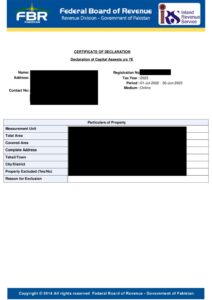Table of Contents
Introduction
In Pakistan, filing your Business Tax Return in FBR Pakistan is a crucial obligation that every business owner must fulfill. Understanding the process and requirements for business tax return filing is essential to ensure compliance and avoid penalties. This article serves as a comprehensive guide to navigating the intricacies of business tax return filing in FBR Pakistan.
Why is Filing Business Tax Return in FBR Pakistan Important?
Filing your business tax return accurately and on time demonstrates your compliance with Pakistani tax laws. It also ensures that you contribute your fair share to the national revenue, which is crucial for the country’s economic development.
Understanding Business Tax Return
Before delving into the filing process, it’s essential to understand what constitutes a business tax return and who needs to file it.
What is a Business Tax Return?
A business tax return is a document that summarizes the income, expenses, and other financial details of a business for a specific tax period. It serves as the basis for calculating the tax liability of the business.
Who Needs to File a Business Tax Return?
Any individual or entity engaged in business activities in Pakistan is required to file a business tax return with the FBR. This includes sole proprietors, partnerships, companies, and other forms of business entities.
Preparing for Business Tax Return Filing
Proper preparation is key to ensuring a smooth and accurate filing process.
Gather Necessary Documents
Collect all relevant financial documents, including income statements, expense records, receipts, and bank statements.
Review Tax Regulations
Stay updated with the latest tax laws and regulations issued by the FBR to ensure compliance and maximize deductions.
Steps to File Business Tax Return
Filing your business tax return involves several steps, which we’ll outline below.
Step 1: Register for NTN
If you haven’t already done so, register for a National Tax Number (NTN) with the FBR. This unique identifier is essential for tax-related transactions.
Step 2: Choose the Right Tax Form
Select the appropriate tax form based on the nature of your business and income sources. The FBR offers different forms for different types of businesses, such as individuals, companies, and partnerships.
Step 3: Fill Out the Form
Carefully fill out the tax form, providing accurate information about your business income, expenses, deductions, and any tax credits you may be eligible for.
Step 4: Calculate Tax Liability
Once you’ve filled out the form, calculate your tax liability using the prescribed tax rates and deductions.
Step 5: Submit the Form
After completing the form and calculating your tax liability, submit it to the FBR through the online portal or designated tax office.
Step 6: Seek Professional Assistance if Needed
If you find tax filing complex or have specific questions, consider seeking assistance from a tax professional or accountant familiar with Pakistani tax laws.
Tips for Ensuring Accuracy
To avoid errors and discrepancies in your business tax return, consider the following tips:
Keep Detailed Records
Maintain organized and up-to-date financial records throughout the year to facilitate the tax filing process.
Double-Check Information
Review your tax return carefully before submission to ensure all information is accurate and complete.
Claiming Adjustable Taxes to Reduce Tax Liability
Once you’ve accurately recorded your business income and expenses, it’s essential to explore options for reducing your tax liability. One effective strategy is to claim adjustable taxes, such as tax credits and deductions, allowed by the FBR.
Adjustable taxes can significantly lower your overall tax burden by offsetting your taxable income. Common adjustable taxes include:
- Tax Credits: These are direct reductions in your tax liability, typically offered for specific activities or investments. Examples include investment tax credits, education tax credits, and energy-efficient property tax credits.
- Deductions: Deductions allow you to subtract certain expenses from your taxable income, thereby reducing the amount of income subject to taxation. Common deductions for businesses may include expenses related to employee salaries, rent, utilities, and depreciation of assets.
By leveraging these adjustable taxes, you can effectively reduce your tax liability and retain more of your business profits.
Conclusion
Filing your business tax return with the FBR Pakistan is a legal requirement that demands attention to detail and adherence to tax regulations. By understanding the process and following the guidelines outlined in this article, you can fulfill your tax obligations effectively and avoid potential penalties.

FAQs (Frequently Asked Questions)
1. What are the consequences of failing to file a business tax return?
Failure to file a business tax return can result in penalties, fines, and legal consequences imposed by the FBR.
2. Can I file my business tax return manually?
While manual filing is possible, the FBR encourages taxpayers to utilize the online portal for faster and more convenient filing.
3. Is there a deadline for filing business tax returns in Pakistan?
Yes, the deadline for filing business tax returns in Pakistan is typically September 30th of each year, though extensions may be granted under certain circumstances.
4. Can I amend my business tax return after submission?
Yes, you can request amendments to your business tax return within the specified time frame, subject to approval by the FBR.
5. Are there any tax incentives available for businesses in Pakistan?
Yes, the Pakistani government offers various tax incentives and exemptions to promote investment and economic growth in certain sectors.
Reference to Filing Assistance Video
For those seeking further guidance on filing their business tax returns with the FBR, I recommend watching the instructional video provided below. This video offers step-by-step instructions and practical tips to simplify the tax filing process:
Instructional Video: How to File Your Business Tax Return with the FBR
Watching this video can provide valuable insights and assistance in navigating the intricacies of tax filing in Pakistan.
Example: Filing Business Tax Return for ABC Trading Company
Step 1: Register for NTN
ABC Trading Company, a wholesale distributor based in Karachi, Pakistan, needs to file its business tax return for the fiscal year ending December 31, 2023. The first step is to ensure they have a National Tax Number (NTN) registered with the Federal Board of Revenue (FBR). If they haven’t already obtained one, they must register for an NTN to proceed with the tax filing process.
Step 2: Choose the Right Tax Form
As a trading business, ABC Trading Company must select the appropriate tax form provided by the FBR for sole proprietors or companies engaged in trading activities. They carefully review the available forms and choose the one that best suits their business structure and income sources.
Step 3: Fill Out the Form
ABC Trading Company gathers all relevant financial documents, including sales records, purchase invoices, bank statements, and expense receipts. They diligently fill out the tax form, ensuring accuracy and completeness in reporting their business income, expenses, deductions, and any eligible tax credits related to trading activities.
Step 4: Calculate Tax Liability
Using the prescribed tax rates and deductions provided by the FBR, ABC Trading Company calculates their tax liability based on the information submitted in the tax form. They meticulously review the calculations to ensure accuracy, taking into account any applicable tax credits or incentives for trading businesses.
Step 5: Submit the Form
Once the tax form is filled out and the tax liability is calculated, ABC Trading Company submits the form to the FBR through the online portal designated for tax filings. They ensure timely submission before the deadline to avoid any penalties or fines.
Conclusion
By following these steps, ABC Trading Company successfully fulfills its obligation of filing the business tax return with the FBR Pakistan. Their adherence to tax regulations and attention to detail ensure compliance and contribute to the country’s economic development.
This example illustrates how trading businesses in Pakistan can navigate the process of filing their business tax returns in accordance with FBR regulations.

How Can I Help You?
- Return Filing Services:
- Whether you need assistance with individual or business returns, I’ve got you covered. Your returns will be prepared professionally and in accordance with Income Tax rules.
- Customized Solutions:
- Have specific requirements or unique situations? Let’s discuss your needs, and I’ll tailor my services to meet your individual circumstances.
Contact Options:
- YouTube Description:
- Find my number in the YouTube description and drop me a message. I’ll get back to you as soon as I’m available.
- Website:
- Visit my website and give me a call or leave a message. I’ll respond promptly to address your queries.
- WhatsApp:
- Prefer WhatsApp? Feel free to send me a message, and I’ll assist you as soon as I’m available.
Professional and Rule-Compliant Services: Rest assured that the services provided will be professional and adhere to Income Tax rules. Your peace of mind is my priority, and I’m committed to offering you the best solutions.
Feel free to reach out whenever you have questions or require assistance with your income tax matters. Looking forward to helping you navigate the world of taxation seamlessly! JazakAllah!








Pingback: How to Get Your 7E Certificate from IRIS - March 15, 2024